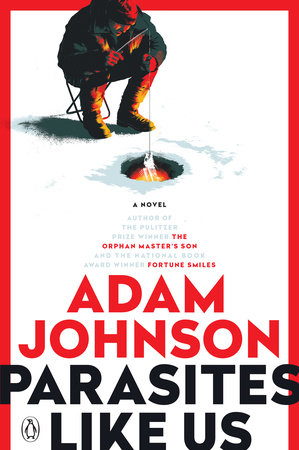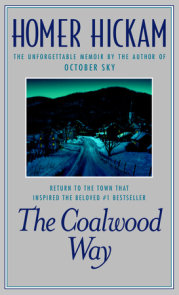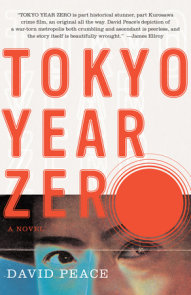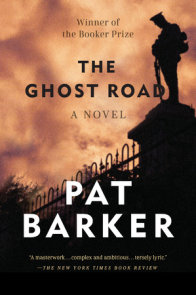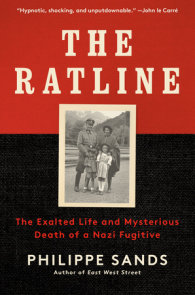READERS GUIDE
Questions and Topics for Discussion
INTRODUCTION
Adam Johnson’s short stories have been praised as “Salingeresque” (New York Times), “remarkable” (New Yorker), and “creating a searing juxtaposition between scientific progress and its futility in the face of mortality” (San Francisco Chronicle). Now, with Parasites Like Us, Johnson lives up to and surpasses that praise in a novel that looks deeply into both the past and the future of the human species.
Parasites Like Us is narrated by anthropologist Hank Hannah, author of the now largely discredited book The Depletionists, which argued that our Ice Age ancestors, the Clovis people, wiped out thirty-five species of large mammals. As the novel begins, Dr. Hannah is haunted by his own past. He is grieving for the disappearance of his mother, the death of his stepmother, and the loss of his former glory as an academic star and darling of the lecture circuit. He does, however, have two brilliant students, Eggers and Trudy, working with him, and together they begin to make discoveries—of the prodigious powers of the Clovis spearhead and of what are possibly the oldest human remains ever found in North America—that would validate the thesis of The Depletionists and resurrect Dr. Hannah’s career. But digging into the past can be a dangerous occupation; it can cast a harsh light on the present. Dr. Hannah sees all too clearly that the selfishness of the Clovis people—their willingness to plunder “the first sunny days of humanity”—is just as strong today, as we continue to exploit the earth and all its creatures for our use. And when a brutally fatal infectious disease sweeps the land, transmitted through the animals we’ve lived on, humans begin a gruesome extermination, a mass slaughter of pigs and cows and chickens, that makes our ancestors look tame. But it is too late to stop the epidemic. Only Dr. Hannah and his small band survive, thanks to a chance encounter with Clovis culture, and they must face a grim journey—through frozen landscapes with burning corpses and roving packs of dogs—into a future that looks all too much like the distant past.
What makes Parasites Like Us such a remarkably ambitious and satisfying novel is its combination of satire and pathos. It is at once a searing critique of human arrogance and a compassionate regard for human weakness, a provocative analysis of where we have come from and a harrowing vision of where we are headed.
ABOUT ADAM JOHNSON
Adam Johnson, a former Wallace Stegner Fellow, teaches at Stanford University. His fiction has appeared in Esquire, Harper’s, and the Paris Review, as well as Best New American Voices four years running. He lives in San Francisco with his wife and newborn son, James Geronimo.
AN INTERVIEW WITH ADAM JOHNSON
What prompted you to write Parasites Like Us? Did you do a great deal of research for the novel?
I’ve always been fascinated by primitive technologies. Growing up, I heard many tales of outdoor survival from male relatives. These were sophisticated men, yet they had hidden abilities, like building snow caves, setting animal snares, or lashing emergency rafts. I never learned any of these skills, mostly because I lived with my mother after my parents’ divorce. In college, however, I met a surgeon whose passion was flint-knapping—the art of making stone knives and points. His dream was to perform heart surgery with stone blades, which, he said, could be made sharper than any scalpel. He was the one who first told me about the Clovis people and the way they had created stone spear points so deadly that even twelve thousand years later, they were nearly impossible to re-create.
In writing this book, I wanted to take the reader back in time—back to a point when human connections to land, food, weather, and so on were intimate ones. I felt that with each chapter, as the book marches forward, the narrator, Dr. Hannah, moves a thousand years back through time. Slowly, he is stripped of modern conveniences—his car, his possessions, his bathroom, and finally things like phones and electricity—until, metaphorically, he has entered the age of the Clovis. The place he arrives at, because of its constant peril, is one where relationships become even more important. Only in a world of primitive technology do friends, family members, and the woman he loves attain the level of interdependence that he’s always hoped for.
I didn’t learn to dogsled or hurl spears to research this book, but I read survival narratives, geology studies, hunting guides, and lithics journals. I devoured many books about early North American peoples and about paleo-anthropology in general. I think a reader will walk away from this book having learned a great deal about the ancestors of this continent, and for that reason, I tried to focus on the themes of paleolithic life, rather than on scientific theories.
Did you intend the novel to be read as a kind of warning? Do you feel the history of the Clovis people has special relevance to our own situation?
The story of the Clovis people is a cautionary tale for our time. The Clovis were probably the first North Americans, though little is actually known about them. They crossed the Bering Land Bridge when the glaciers retreated at the end of the last ice age, a time when most large mammals—like the mammoth and the mastodon—went extinct. Then in 1929, at a site near Clovis, New Mexico, a mammoth bone was found with a large spear point embedded in it. Many more sites were found, and a new portrait of the Clovis people began to emerge, one in which humans entered a new frontier and founded an empire on hunting. Within these three centuries of the Clovis’ arrival, most of the large mammals of North America had been eradicated, including mammoths, camels, horses, and oxen, leaving thousands of future generations without the animals needed for domestication, transportation, and agriculture. After most of the large animals of America disappeared, so did the Clovis, and this is the metaphor at the heart of the book: a people came to a new frontier and built a grand culture based on natural resources, and once those resources were depleted, the culture fell apart, leaving their descendants impoverished.
What similarities do you see between the stories told by anthropologists and those told by novelists?
I don’t think there’s any scientific method in my work, but I feel an affinity for those who apply it, especially when constructing narratives about the past, the way historians and paleo-anthropologists do. I do feel anthropologists must take some the same imaginative leaps as fiction writers to find truth out of the details. The writer must construct the life of a living character in the same way that an anthropologist must construct the lives of the dead out of fragments.
How would you describe the relationship between Dr. Hannah’s family and the larger history of the human family in the novel?
Dr. Hannah’s personal creation myth is based on his abandonment by his mother, and of course, he secretly fears he exhausted her love and drove her away. He has no other way to approach the world than by way of this essential story, and it is only fitting that his theory of the Clovis is one in which a people exhausted all that supported them, thus causing their tribe to disband.
Michiko Kakutani has applied the term “Salingeresque” to your work. Do you feel a particular affinity for Salinger? What other writers have been important influences for you?
I think of Salinger as a “voice” writer; he had a pitch-perfect ear for how his characters spoke, especially when telling their own stories. As a writer who loves to work in the first person, I truly admire this quality. Something my characters tend to share with Salinger’s is a constant concern with what’s false and what’s real. His characters tended to be flawed and a little “phony” themselves, but they yearned for the real, pure thing that could redeem them. The comparisons probably end there. Salinger was a really, really good writer, and I see myself as a comparative beginner.
A book that influenced me was early was The Mosquito Coast by Paul Theroux, which I read after high school. I wasn’t a big reader back then, but the characterization of the father figure spoke to me—here was another father who dropped out of society and attempted to go “back to basics” in an effort to reinvent himself. I also shared the narrator’s awe for an iconoclastic and self-destructive father. The “well-meaning but deluded believer” is a repeating character of mine, and I first encountered it in The Mosquito Coast.
Do you have a strong personal or autobiographical connection to the novel, or is it a purely imaginative work?
The novel attempts to answer a simple yet eternal question: Where do people go when they leave us? When my mother was a child, she was abandoned by her mom. And when I was a child, my parents were divorced. While my mother rarely mentioned her mother, I constantly wondered where my father was. What was he doing? I wanted to know. Who was he with, and what television show was he watching? I wanted to know what this better life was, this life that didn’t include my mother and me. I placed this seed of speculation in my central character, and soon it seemed right that he was a paleo-anthropologist, one who specialized in faraway peoples, and this became a vehicle to explore the tensions between need and inaccessibility.
Do you have any special writing routines or rituals? What are you working on now?
The only writing ritual I have is a sleeping baby. When the little one finally goes to sleep, then I can go to work. Right now I’m in the first stages of a new novel set in Los Angeles.
DISCUSSION QUESTIONS






